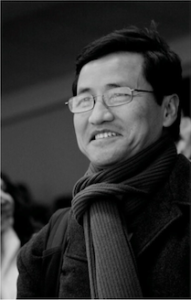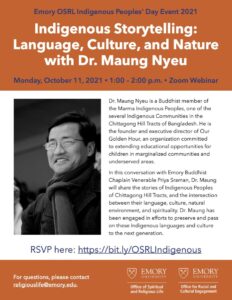Indigenous Storytelling: Language, Culture, and Nature with Dr. Maung Nyeu
Monday, October 11, 1:00-2:00 PM EST
Location: Zoom Webinar
Sponsored by: Emory’s Office of Spiritual and Religious Life
RSVP here. For questions, please contact religiouslife [at] emory [dot] edu.
Dr. Maung Nyeu is a Buddhistmember of the Marma Indigenous Peoples, one of the several Indigenous Communities in the Chittagong Hill Tracts of Bangladesh. He is the founder and executive director of Our Golden Hour, an organization committed to extending educational opportunities for children in marginalized communities and underserved areas.
In this conversation with Buddhist Chaplain Venerable Priya Sraman, Dr. Maung will share the stories of Indigenous Peoples of Chittagong Hill Tracts, and the intersection between their language, culture, natural environment, and spirituality. Dr. Maung has been engaged in efforts to preserve and pass on these Indigenous languages and culture to the next generation.
Dr. Maung Nyeu comes from the Marma Indigenous Peoples of Chittagong Hill Tracts, Bangladesh. He is the founder and executive director of Our Golden Hour, an organization that is committed to serving educational needs to the children in marginalized communities and underserved areas. He is a award-winning author of children’s books and multilingual picture dictionaries, and was nominated as one of the fifty most inspiring stories by BBC World Service.

indigenous-peoples-day-event-2021-LETTER-DIGITAL (2)

